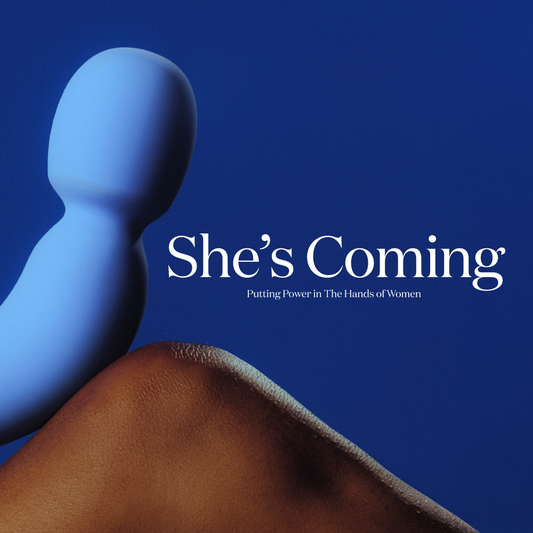It is both surprising and not surprising that Facebook is (still!) rejecting ads for products and services that pertain to the health of women and people of diverse genders. Surprising, because it’s 2022. Not surprising, because sexism and discrimination against bodies with vulvas is rarely surprising, sadly. Here at Dame, we are no strangers to having our ads denied. The conversation around pleasure as a part of wellness seems to be restricted and hampered at every turn. It’s just curious to see a tech giant like Meta have a restrictive ad policy that shows it doesn’t understand or care about how bodies without penises function. The Center for Intimacy Justice (CIJ) reported that over the last 3 years Facebook/Instagram rejected the ads of at least 60 businesses serving the health of women and people of diverse genders, citing a policy that prohibits ads for “Adult Products or Services.” The policy states: “Ads must not promote the sale or use of adult products or services. Ads promoting sexual and reproductive health products or services, like contraception and family planning must be targeted to people 18 years or older and must not focus on sexual pleasure.” This policy is just vague enough to allow Facebook to apply it “unevenly” (in the diplomatic words of CIJ) — given that ads that are (less diplomatically) all about dicks and balls were disproportionately allowed:  These ads for products and services related to endometriosis, menopause, consent, breastfeeding, pelvic floor wellness, and more were among those rejected by Facebook:
These ads for products and services related to endometriosis, menopause, consent, breastfeeding, pelvic floor wellness, and more were among those rejected by Facebook:  So how does the tech giant have a leg to stand on? Let’s break down this policy, starting with the title: Adult Products or Services.
So how does the tech giant have a leg to stand on? Let’s break down this policy, starting with the title: Adult Products or Services.
What Is an Adult?
The way Facebook (Miss Meta if you’re nasty) defines “Adult” is colloquial. Because there are lots of products and services that adults use — ridesharing, fancy candles, tricked-out cleaning tools, crippling student loan debt, LinkedIn, bland breakfast foods, tablets or pills for when said bland breakfast foods give you heartburn anyway — that don’t qualify as “Adult.” Personally, I knew I was an adult when I started describing places as “too loud” the way a child describes food they don’t like as “spicy.” The way we’re using “Adult” here is like, “you know what I mean … 👉👌 😉” It has nothing to do with all the things that actually signify adulthood, the least of all age. What does it mean to be an adult? That you can finally play with your genitals? Or is this policy that restricts certain ads more about not exposing “the children” to the horrors of other bodies? Because what if we had to learn what menopause is? Or what if we had to take accountability for the ways we have failed birthing parents? The children aren’t ready! Meta gets a little more clear in the second line of this policy: “Ads promoting sexual and reproductive health products or services…” Ohhhhh. So by “adult” you mean “sexual and reproductive health.” God (literally God) forbid we say “sexual or reproductive health” because that would imply that sexual health isn’t always about reproduction. Oops, brb, have to go hear out this group of girls saying that Goody Parker’s specter is tormenting them! OK, back, blessed be the Meta fruit. If you were concerned that its policy about “adult products or services” wasn’t puritanical enough, don’t worry because ads promoting products or services “like contraception and family planning must be targeted to people 18 years or older and must not focus on sexual pleasure.” LOL OK, CHASTEBOOK.
Whose Pleasure Matters More?
What’s happening here is Facebook subtly supporting the idea that sex is only for reproductive purposes and, even then, it should not be enjoyed. So if we drill down on that, we’re saying that male orgasm is necessary for reproduction and female/non-penis orgasm is unnecessary, possibly even a distraction from the Point of Sex, and therefore doesn’t matter. Also, once vulva-havers are done bearing the fruit of these Necessary Orgasms, their bodies go back to being irrelevant, inconsequential, unsolvable mysteries! Pain in your Barbie parts? Who cares as long as a penis can still get in! Menopausal mood swings? Women be shopping! The policy also implies that if you are using contraception, you should be doing it as practice and not for fun. An ad for a workshop on consent was banned, maybe for implying that people are having sex recreationally? We can’t do that, we’re running out of scarlet letters and you know there are a lot of supply chain issues right now! Sidenote: do you know what you want your avatar to look like in Gilead yet? So it’s clear what the priorities are: dicks and balls matter and are “necessary;” vulvas, vaginas, uteruses, or ovaries don’t and aren’t (beyond their supporting role as a vessel). With this interpretation of the policy, what is allowed and what is banned makes perfect sense. Or does it? Let’s look at this ad that seems to be about lotion for jacking off:  Hey, mister, what do you mean “solo” time? That sperm needs to go in an egg! In a womb!!!! And no one should be enjoying that! Don’t you know what year it is? (The answer: 1642)
Hey, mister, what do you mean “solo” time? That sperm needs to go in an egg! In a womb!!!! And no one should be enjoying that! Don’t you know what year it is? (The answer: 1642)
The Normalization and Emojification of Male Pleasure
But seriously, the answer could be as simple as laziness. This ad is undoubtedly about Adult Pleasure (because, as we all know, “solo time” = 🍆 ✊ 😉 am I doing emojis right?) but relies on heavily veiled language and idiom. So whoever (whatever) is scanning these ads won’t realize that lotion in a hand + rocket ship + solo play = Adult Product or Service the way we do. Because male masturbation is normalized and encouraged and talked about. We have more language around male pleasure available for advertisers to apply creatively to skirt certain puritanical standards and policies. And we aren’t saying that these companies shouldn’t be allowed to advertise either (cool move, though, New York City Subway), or that male pleasure should also be prohibited. We’re saying that there’s a double standard here that needs to be examined. AND that we don’t have a basic understanding of or the right emojis to talk about endometriosis (💥♈ 🤕?) to work around the policy in the same way penis-oriented products do.
Labia Minora? Never Heard of Her
Pleasure as an unintended consequence of reproduction aside, let’s talk about health. Why are ads for products that assist with the pelvic floor getting banned? Because they are getting in the way of a penis? Or, more likely, because they have nothing to do with a penis, which is a thing “we” understand more? It’s like Facebook saw this vFit ad and just said, “I don’t know what that is. Stop talking.”  Pelvic floor muscles? SOUNDS SUS. Because having a vagina is a technocrime? Or was this ad banned because we can’t deny that pleasure is feeling good, and pain relief is a shade of pleasure, so any product that helps people with vulvas feel good or relieve pain is “focusing on sexual pleasure”? But it’s ok for people with penises to feel good and relieve pain, even if it’s an egoic pain (inability to reliably get an erection, for example). Maybe (probably) it’s not that deep, which returns to a general lack of understanding. So I guess we’re back to vaginas being a technocrime (a word I got from The Bible). According to the New York Times piece, “Why Did Facebook Reject These Ads?” “A spokesperson for Meta said that Facebook does not have a blanket ban on words like ‘menopause’ or ‘vagina’ but considers ‘how each ad is positioned.’” Surely as a society, our understanding of the human vagina has evolved beyond “penis go in, baby come out”... right? So is it that we don’t know or that we don’t care? Maybe it’s a mixture of the two. I, for example, care, but could not tell you where my own pelvic floor is. I have a guess, but I don’t know for sure. After all, Miss Frizzle never took the Magic School Bus on a tour of the female reproductive system (10:1 odds Arnold gets stuck in the fallopian tubes).
Pelvic floor muscles? SOUNDS SUS. Because having a vagina is a technocrime? Or was this ad banned because we can’t deny that pleasure is feeling good, and pain relief is a shade of pleasure, so any product that helps people with vulvas feel good or relieve pain is “focusing on sexual pleasure”? But it’s ok for people with penises to feel good and relieve pain, even if it’s an egoic pain (inability to reliably get an erection, for example). Maybe (probably) it’s not that deep, which returns to a general lack of understanding. So I guess we’re back to vaginas being a technocrime (a word I got from The Bible). According to the New York Times piece, “Why Did Facebook Reject These Ads?” “A spokesperson for Meta said that Facebook does not have a blanket ban on words like ‘menopause’ or ‘vagina’ but considers ‘how each ad is positioned.’” Surely as a society, our understanding of the human vagina has evolved beyond “penis go in, baby come out”... right? So is it that we don’t know or that we don’t care? Maybe it’s a mixture of the two. I, for example, care, but could not tell you where my own pelvic floor is. I have a guess, but I don’t know for sure. After all, Miss Frizzle never took the Magic School Bus on a tour of the female reproductive system (10:1 odds Arnold gets stuck in the fallopian tubes).
It’s What’s on the Inside That (Also) Counts
The long-term solution, proposed by Jackie Rotman, the founder of the Center for Intimacy Justice, is “Facebook deciding that this is something they’re going to fix.” Essentially, Meta making the necessary changes to both learn and care about female and gender diverse bodies. Learning could look like narrowing the definition of what classifies as an “adult product or service,” so that all non-pornographic products and services that support sexual function can peacefully exist, advertise, and improve wellbeing. Caring could look like descandalizing non-male bodies — normalizing, not banning or constricting, conversations around how bodies with vulvas function and change beyond puberty. Equitable policy changes in tech can only stand to challenge the existence of double standards across the board. Meta could apply the time and resources necessary to adjust and improve the AI responsible for scanning the ads, bringing it into this century, rather than waiting for individual small businesses to appeal rejections. Ignorance is a bad look in 2022. In the short term, maybe we can learn more about ourselves, as an act of self-care, so we can be better self-advocates in the face of ignorance. I know, I know! Placing the responsibility on the individual is a cop-out! I don’t want to learn where my pelvic floor is, either. But if and when I am not feeling good in my body, I don’t want some loophole-filled, biased policy standing between me and what I need to feel better.




















































